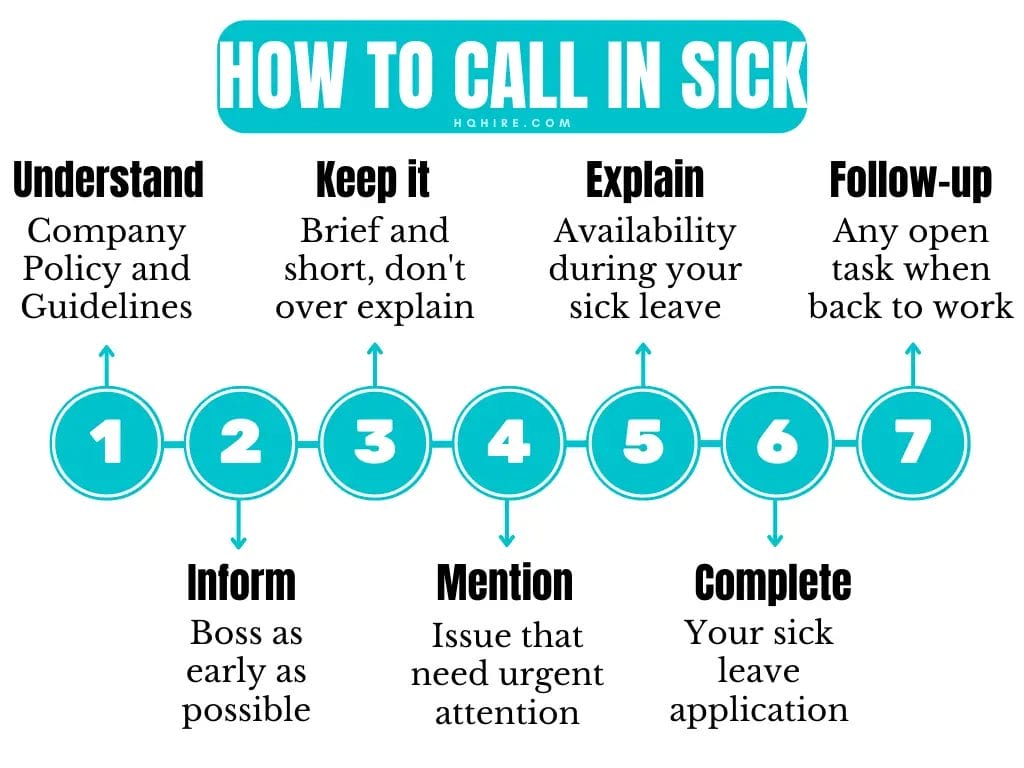|
Listen To Article
Getting your Trinity Audio player ready...
|
Calling in sick for work often makes employees feel uncomfortable.
Even when you might have a good reason to get sick leave on short notice, you may worry that you are not sick enough, or your boss may think you are just being lazy and want to miss work.
Like you, most employees do not know how to call in sick, even when they are genuinely sick.
PS. You can take a short Quiz to know if you should call in sick after this.
KEY TAKEAWAY
- Notify your employer as early as possible to facilitate smooth planning and minimize disruptions.
- Share essential information about your illness, strike a balance between transparency and privacy.
- Offer alternative ways to manage workload during your absence, showcasing a commitment to minimizing disruptions and ensuring a smooth workflow.
- While occasional sick calls are understandable, chronic absenteeism can impact your professional standing.
- After an extended absence, proactively update your supervisor on your recovery status, express commitment to catching up, and discuss a plan for reintegration into work.
How to Call in Sick Professionally at Work
The best way to call in sick is by text message. When you call in sick, keep the reason to the point and with clarity. Your boss will not want to know every symptom of your illness. If you are leading a team or working with a team, let your team know about your absence as well.
Calling in sick professionally is to ensure that your absence will have minimal impact to the team’s operation.
Here, this guide will show you how to call in sick to work professionally when you really need a day off.

1. Understand your company’s policy on taking sick leave
Every company has a different policy when calling in sick for work. Check your employee handbook and see whether your employer allows you to call in sick by making a phone call, sending by text message, or sending an official email.
While most companies do not specify your actual mode of communication when calling in sick, it is good to follow your employer’s protocols.
If the company’s policy only indicates that you should inform your employer when you are taking sick leave. You may want to choose to send a text message as your preferred form of communication.
2. Inform your boss as early as possible about being sick
You should inform your boss as soon as you realize you won’t be able to attend work. Letting your boss and coworkers know that you will be out sick early allow the sufficient time required to make the necessary arrangement for a replacement to fill in for you.
Check your company’s policies, as some may require notification within a specific timeframe.
- Inform as early as possible in the morning when you wake up if you’ve confirmed that are not feeling well on that day and you will be taking a sick day.
- Inform as early as possible before your shift starts if you’ve confirmed that are not feeling well and you will be taking a sick day.
- Inform as early as possible when you got the medical appoint dates and will be taking a sick day.
When is the best time to call in sick?
- If you are feeling very ill the night and know that you will be too ill to come to work, you can inform your boss during the evening.
- If you are feeling sick in the morning before coming to work, you can inform your boss first thing in the morning.
Informing your boss early about taking sick leave can make you look professional.
3. Keep it brief
Don’t go into details about your illness. No one wants to know the specifics about your illness or the list of symptoms you are currently experiencing. Letting your boss know that you will be taking sick leave should be brief and concise.
Just letting your employer know that you will be calling out of work because you are not feeling well will be sufficient.
The reason for taking sick leave at the last minute should be believable, relatable, and reasonable.
If questions were asked, simply answer directly. You should not go into detail explaining your illness.
4. Mention any issues that may require urgent attention
Let your boss and team know if there is any issue that may require urgent attention when you are on sick leave. This will ensure minimal disruption to the operation of the team even during your absence at work.
- Backup: Make arrangements with your colleagues as a backup in your absence.
- Urgent Issue: Make arrangements that urgent tasks will be completed even in your absence.
- Important Information: Pass down important information to relevant personnel so your absence won’t impact the operation of the company.
Being a professional at work is to be accountable for your job role, and ensure important issues are taken care of even in your absence.
5. Explain your availability during your sick leave
Consider letting your boss and team know that if you will be available during your sick leave will help set expectations of your presence at work.
- Available: Let them know if you will be able to reply to emails or do any work when you are sick at home.
- Semi-available: Let them know if you will be replying to any urgent emails if requested.
- Not Available: Let them know if you are too sick to perform any work or check your email when you are resting at home.
Let your boss and team know about your availability will allow them to decide what arrangements have to be made during your absence.
Furthermore, if you are too sick to even get out of bed, it will be good if you will be given undisturbed rest to recover from your illness.
6. Complete your sick leave applications when back to work
As you’ve recovered and gone back to work, often there will be documents required to be filled, or systems required to be updated for taking sick leave.
Often, notifying your employer through text message, email, or call is insufficient to complete the sick leave application process.
Most companies will require employees to bring in doctor’s note or medical certificate to prove that they are truly sick.
This objective evidence and documentation are often required for your sick leave to be approved by the company.
7. Follow up and work hard on any open task when you are back to work
Coming back to work, you always want to work hard and catch up on any pending projects, work tasks, or meetings while you are on sick leave.
Thank your colleagues who have taken the extra responsibility to help you in your work during your absence.
Work hard and show your boss and your team that you are committed to your job role and can be trusted to get the job done.
8. Provide proof of medical certificate when calling in sick
As a best practice, it is always advisable to provide medical certificate when you are calling sick. It is a proof of assessment by medical professional that you are not suitable for work and requires rest for the day.
Even when you company may not require a medical certificate for talking a sick day, it is still a good practice to follow.
Most Common Reasons for Taking Sick Leave at Work
Employees take sick leave for many reasons. Below are some of the most common reasons why an employee takes leave.
| No. | Reasons for Sick Leave | Percentage |
|---|---|---|
| 1 | Minor Illnesses | 26.1% |
| 2 | Musculoskeletal Related | 15.4% |
| 3 | Mental Health Conditions | 11.6% |
| 4 | Gastrointestinal Related | 5.4% |
| 5 | Headaches and migraines | 4.9% |
| 6 | Respiratory Related | 4.4% |
| 7 | Eye/nose/mouth/dental Related | 3.1% |
| 8 | Genito-urinary Related | 3.1% |
| 9 | Heart blood pressure circulation Related | 2.7% |
| 10 | Others | 17.1% |
According to the Office of National Statistics:
- 1 in 4 call in sick due to minor illnesses.
- 1 in 7 call in sick due to musculoskeletal-related issues.
- 1 in 10 call in sick due to mental health conditions.
How To Call In Sick Last Minute (with Example and Template)
Calling in sick at the last minute can cause your boss and coworkers more inconvenience than leaving work early, but sometimes, it is unavoidable.
- You can call your boss to take a sick leave, but if you catch your boss at a bad time, it may lead to unwanted complications.
- You can call in sick by sending a text message or email, it is usually the preferred method of communication.
Call in Sick Message (with Example and Template)
A text message will allow you to inform your boss of your absence early, brief and with clarity.
Here are some good examples you can use to call in sick when you really need it.
Tip: Sending a quick text message to inform your boss that you will be calling in sick is always the best way to take sick leave at the last minute.
Call in sick on a short notice
“Hi [Boss Name], I am having [Reason for sick leave] this morning.
I will need to take a sick day off today to see the doctor.
I’ll keep you updated when I will be back to work as I get better.
I’ve texted [Colleague’s Name], and he/she will be helping to resolve any urgent matters during my absence.
Please let me know if there is any urgent issue that requires my attention.
Apologist for the short notice.”
Call in sick at a new job
“Hi [Boss Name], sorry, but I am not feeling well and I won’t be able to come to work today.
I will be informing my trainer about my absence.
I am hoping to feel better by tomorrow, so I can come to work and continue with the training that you’ve generously arranged for me.
Should there be any changes, I’ll keep you updated.”
Call in sick an hour before work
“Hi [Boss Name], I am having a headache this morning, and I need to take a sick leave today.
Do drop me a message if any urgent issues arise.
I’ll most likely be back by tomorrow when I get better.
Sorry for the inconvenience caused.”
Call in sick when working from home
“Hi [Boss Name], I woke up not feeling well and will need to rest for the day.
I’ll try to respond to any urgent emails when I can, but I’ve asked [Colleague’s Name] to back me up for today.
Hopefully, I will get better tomorrow.”
Call in sick after vaccine
“Hi [Boss Name], I’ve taken vaccine yesterday and I am having a fever. I’ll need to rest for the day.
I’ve arranged with [Colleague’s Name] to help with any urgent matters for the day.
Will probably get better by tomorrow, but should there be any changes, I’ll keep you updated.”
Call in sick due to period cramps
“Hi [Boss Name], I woke up having severe abdominal cramps and I am feeling nauseous. I will need to stay home and rest for today.
[Colleague’s Name] has agreed to help follow up on any urgent matters during my absence.
I’ll keep you in the loop, as I hope I will feel better by tomorrow.”
Call in sick via email (with Example and Template)
If you are working remotely and you need to take a sick day, you can call in sick by email.
Email is especially useful if you are calling in sick while working from home.
Notification performed by email will help in the arrangement of follow-up actions when required.
Here is a template, you may want to use to send an official email to notify your boss that you are taking your sick leave.
Call in sick email
Subject: [Your Name] – “Calling in Sick” or “Not Feeling Well Today”
Hi [Boss Name],
I woke up not feeling well this morning and will need to take a sick day to rest for the day.
Apology for the late notice, I hope I will get better by tomorrow but will keep you updated if there is any changes.
I’ve texted [Colleague’s Name] with the things he/she may need to do in my absence.
I will be available by email for any urgent matters.
Thanks,
[Your Name]
Up Next… Acceptable reasons to call in sick when pregnant.
“Why doesn’t everyone take sick leave even when they need it?”
Check out this video below!
Frequently Asked Questions (FAQs) on Taking Sick Days at Work
Read Also:
- 20 Online Meeting Etiquette in The Workplace (Remote Work)
- How to Host Effective Online Meeting (Beginner’s Guide)
- Online Meetings in the Workplace (Complete Guide)
- +15 Best Webinar Software for Business and Workplace (Live & Automated)
- Best Practices For Confirming a Meeting
Join over 11,000+ achievers who are committed to achieving their career goals!






